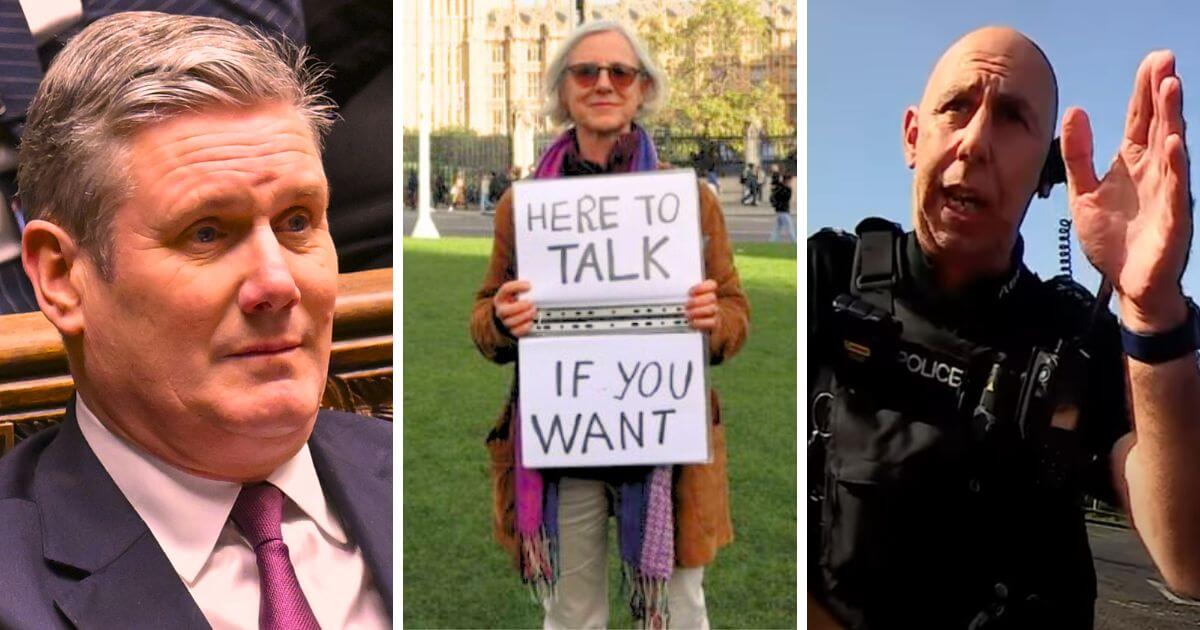The Government will be introducing buffer zones outside abortion clinics nationwide from 31 October 2024, criminalising offering a vital support option to women.
Earlier today, the Home office announced that abortion buffer zones would be implemented outside abortion clinics across the country from the end of next month. The buffer zones are part of the Public Order Act 2023, which became law last year and will operate within 150m of “any part of an abortion clinic or any access point to any building or site that contains an abortion clinic”.
Now, hundreds of women who are helped outside abortion clinics by pro-life volunteers, who provide them with practical support and make it clear to them that they have another option other than going through with the abortion, may be denied such help.
From 31 October 2024, this vital practical support provided by volunteers outside abortion clinics will be removed for women. A Home Office press release states “Anyone found guilty of breaking the law will face an unlimited fine”.
Section 9 of the Public Order Act 2023 makes “influencing” any person who wants to access an abortion clinic illegal. This vague term has left campaigners concerned that this Bill could make silent prayer illegal as well as consensual communication.
Conflicting understandings of the legislation
While some reports and events in Parliament indicate that silent prayer and consensual communication in the context of the buffer zone will be made illegal, other sources from the Home office indicate this may not be the case.
In March last year, before the law had received Royal Assent, MPs voted against an amendment to lessen the negative impacts of the buffer zone clause that was added to the then Public Order Bill.
Amendment A would have ensured that silent prayer and consensual communication were still permitted outside abortion clinics. This amendment was rejected, with MPs voting by 298 to 117 against it. Another amendment (B), which would have required a review to take place before buffer zones came into force, was not taken to a vote.
At the same time, other sources in the debate about the implementation of the abortion buffer zones have sent conflicting messaging about what the Act criminalises.
In September last year, after the law had been passed but before it had been implemented, the former Home Secretary, Suella Braverman, reminded police in the UK that “silent prayer, within itself, is not unlawful”, raising questions about how exactly the legislation set to come into force next month will actually be implemented.
“[H]olding lawful opinions”, the letter reminds officers, “even if those opinions may offend others, is not a criminal offence”.
In the letter, the Home Secretary quotes His Majesty’s Chief Inspector approvingly “The police […] aren’t there to champion social change or take sides. This includes a requirement to preserve all rights, including the right to free speech”.
Shortly after the Home Secretary’s intervention, the then-Conservative Government published ‘Non-Statutory Guidance on Abortion Clinic Safe Access Zones’ and launched an accompanying consultation.
The Non-Statutory Guidance stated that “Prayer within a Safe Access Zone should not automatically be seen as unlawful”, and clarified that this was especially the case when it came to silent prayer.
The Non-Statutory Guidance also stated “It would not normally be in the public interest for police to take action unless they reasonably believe that the acts/behaviour in question would have a direct link to any person’s decision to access abortion services, or would obstruct or impede such access. Nor would it generally be in the public interest for officers to pursue criminal proceedings where there is no evidence that anyone was in fact influenced, obstructed, harassed, alarmed or distressed”.
The results of the public consultation undertaken on the content of the non-statutory guidance were never published.
Local buffer zones subject to legal challenge
Local buffer zones are already being subjected to legal challenge, with one woman, Isabel Vaughan-Spruce, who was arrested twice for silently praying outside an abortion clinic, receiving a £13,000 payout in acknowledgement of her unjust treatment.
In another high profile case, a priest was charged for allegedly breaching an abortion buffer zone by praying silently and holding a sign with the words “praying for freedom of speech” near a closed abortion clinic in Birmingham. He also faced a further charge for an “Unborn Lives Matter” sticker on his car that was parked nearby.
The Crown Prosecution Service eventually dropped the charges against Fr Gough but made it clear that they could be reinstated.
A military veteran, Adam Smith-Connor, who prayed silently about his own encounter with abortion near a facility in Bournemouth, is currently facing trial at Poole Magistrates’ Court.
A pensioner from Dorset, Livia Tossici-Bolt, is also being prosecuted for holding up a sign within an abortion clinic buffer zone reading “Here to talk if you want”.
Helped by pro-life volunteers
One woman who was helped by pro-life volunteers outside an abortion clinic, Alina Dulgheriu, shared her personal experience of being helped by pro-lifers outside an abortion clinic.
“In 2011, I was single, abandoned, facing unemployment and terrified when I discovered I was pregnant” she said.
Alina had booked an abortion as she felt she had no other options and “little in the way of financial or emotional support”.
“I wanted to keep her [my baby], but I didn’t know how, so my hope rapidly began to fade. The day that I turned up to my abortion appointment, a volunteer outside the clinic gently gave me a leaflet”.
“Somewhere beneath the palpable anxiety and pressure, I felt it provided me with exactly what I was longing for. Some would say I already [chose] abortion, but the truth is I didn’t choose it. The pro-life vigil gave me the hope I was searching for”.
“Had I not received the support from volunteers, my beautiful daughter would not have been here today”.
“I chose to accept help. It wasn’t easy, but with the support of the group who had given me that leaflet, I could not be [prouder] of the life my daughter and I have charted [together]”.
She added that “hundreds of women” have benefited from receiving the same kind of support.
“It is worrying that we will consider denying vulnerable women access to this potentially life-changing information, especially when facing one of the most challenging decisions of their lives that could have lasting ramifications on their mental and physical health”.
Spokesperson for Right To Life UK, Catherine Robinson, said “Hundreds of women have been helped outside abortion clinics by pro-life volunteers who have provided them with practical support, which made it clear to them that they had another option other than going through with the abortion”.
“The implementation of buffer zones next month will mean that vital practical support provided by volunteers outside abortion clinics, which helps to provide a genuine choice, and offers help to women who may be undergoing coercion, will be removed for women and many more lives will likely be lost to abortion”.
“It is unacceptable that the results of the Government consultation on abortion buffer zone guidance was never released, especially given the unclear meaning of the legislation”.












